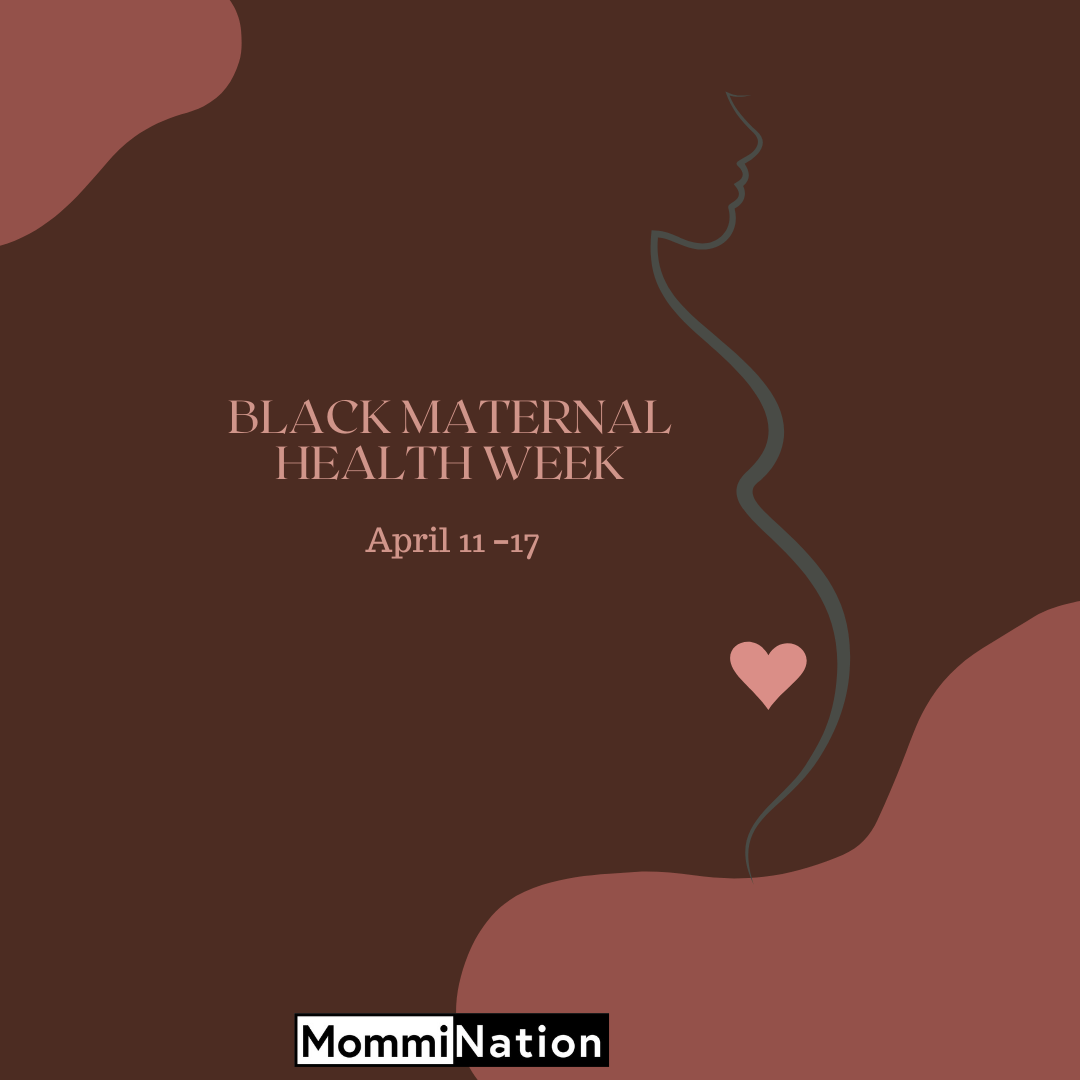For Black Maternal Health Week MommiNation sat down with board-certified obstetrician-gynecologist, Dr. Pamela Brug, MD, MS, to talk about maternal health.
MommiNation: Dr. Brug, what are some of the key factors that negatively affect the health of Black women during and after pregnancy?
Dr. Brug: One of the leading causes of death during or surrounding a pregnancy is related to hypertension. And, the rate of hypertension is greatest among Black pregnant persons, as is heart disease. We also have causes that are preventable such as postpartum hemorrhage, meaning bleeding after delivery. Infection is another thing that we know can be prevented. Sixty percent of pregnancy-related deaths are preventable.
Systemic racism, and the idea that Black pregnant persons are not listened to, and their feelings and their words are discounted or not heard, is also having a negative impact on maternal health outcomes. We need to address the health of individuals before they get pregnant, and we need to address the impact of social determinants of health, and the problems that exist within the healthcare system— including systemic racism.
MommiNation: Are there things that women can advocate for with physicians to make sure that risk is minimized?
Dr. Brug: One of the things that we have to keep in mind is that a great portion of our pregnancies are unplanned. Some of that has to do with access to long-term, reliable contraception. I say that because if you have a planned pregnancy, you have the ability to adjust and prepare for a pregnancy even if it’s high risk, versus if it’s unplanned and you may not find out about your pregnancy for months when some of the complications and effects on the pregnancies have already occurred. So, one thing women can do is make sure they get information about long-term, reliable contraception if desired. It is important for people to discuss that with their gynecologist or nurse practitioner— whoever is providing them with information about contraception.
Also, we know that obesity affects both hypertension and diabetes, and these are very common medical disorders that can be present while someone is pregnant. So, just for your own health, it is important to work, if you can, with a doctor and nutritionist. A lot of the clinics nowadays have nutritionists to help in regards to what you can and cannot eat, and who can outline what other options are available for weight loss and working seriously with some type of exercise program to help. That alone may help with your high blood pressure and diabetes. We see patients who have very clearly taken on weight loss and they’ve been removed from their medication. So, that is an important factor. And, you can get a consultation with your obstetrician where you ask: “what are the things that I can do for myself before I get pregnant?” “What are my risks?” It’s called a “preconception consultation.”
MommiNation: During pregnancy and delivery, what are the leading causes of death and poor outcomes for women or pregnant persons?
Dr. Brug: The leading causes of poor outcomes associated with labor are basically the ones that I’ve stated, one is related to hypertension. There is a hypertensive disorder called preeclampsia, which is basically high blood pressure during a pregnancy. That is the main health issue during labor that is problematic. But, we have to consider that the risks can extend for one year after delivery. Once you deliver, the main challenge is bleeding— bleeding, both internally, if you’ve had a C-section, or externally if you’ve had a vaginal delivery or a C-section.
Then there’s something called cardiomyopathy, which is inflammation of heart muscle that doesn’t allow the heart to work well. We don’t really know, necessarily, what the cause is. The symptoms are like heart failure. With cardiomyopathy the heart isn’t pumping well, so fluid starts to collect in the lungs, swelling of the extremities, at least the lower ones, like the legs, and shortness of breath. It is important to know that these symptoms are not common—they are not a natural part of pregnancy or birth. This is one of the reasons why it’s important to have a physician or an obstetrical provider who listens to you. Because you don’t want them to say, “Oh, you’re short of breath because you just had a baby.” And, the next thing you know the person is in the ER coding.
MommiNation: Are there other factors that pregnant persons should watch out for?
Dr. Brug: Infections. Infections of the uterus are increased with C-sections. It can occur with a vaginal delivery as well. And, any infection if it starts in the uterus, there are vessels, there is blood going in and out, so infections can spread to the rest of the body and can eventually cause sepsis. Another problem which can lead to complications and death is blood clot formation. Sometimes a blood clot can get into the lungs. This is called a pulmonary embolism. The symptoms can be difficulty in breathing, chest tightness or pain and feeling like your heart racing.
We also have to discuss the risk of depression and anxiety during pregnancy and after birth. In its extreme this includes suicidal and homicidal thoughts. It’s very important that a pregnant or recently delivered person seeks help or advice and not accept that it’s “the baby blues.” There is therapy and counseling available. This is essential because, if these symptoms are not addressed, they may lead to self-medicating with alcohol and/or drugs.
MommiNation: Are there things that women can talk to our doctors about beforehand in terms of pain management during and maybe after labor, especially if they had a C section?
Dr. Brug: Yes. So, studies have shown over and over again that a Black person’s pain tends to be discounted, or not believed. So, say you come into labor and you are having pain. The common thing these days is to get an epidural. The epidural is done by an anesthesiologist. They deliver medication through a little tube that goes into your back through the back muscles and ligaments into a space before the spinal canal where your nerves are. Once the medication is given through the tube it will shortly lead to you not feeling the contractions.
Now, I think people are doing a little bit better for advocating for themselves, but one of the things that has happened was that some patients would say, “I’m in pain,” ask for an epidural and the care provider would say, “Well, it’s too early,” or “it’s not bad yet,” or “if you think it’s bad now you have no idea how bad it is going to get,” or “breathe through it,” and not call the anesthesiologist for them to be evaluated. This still happens in some hospitals and labor and delivery units. But what people need to understand is that they have the right for their pain to be taken care of adequately.
MommiNation: What can we do?
Dr. Brug: You can speak with your OB or Midwife about your options beforehand. They know what is available at the delivering hospital. Especially if it’s early on, you may just want IV medication. We don’t really want to do medication by mouth because we try to keep things out of the stomach because side effects such as nausea and vomiting may occur. Also, it takes a while to take effect. Depending on what hospital you’re in, there are different types of epidural anesthesia.
Remember that with epidurals the nerves are anesthetized not only for the uterus, but also for your legs, so you’re not able to walk. If you can’t feel your legs, we can’t let you get up and walk. You can’t get up to go to the bathroom. So, if it’s very early on, and the pain is not too bad, you’d rather have some IV medications. That decision is ultimately yours. Remember only you know how much pain you can tolerate. And there are some hospitals that have what’s called a “walking epidural.” It really depends on what’s available at the hospital.
Most importantly, if you don’t get the response that you think is necessary to help you with the pain, it is important to know that every hospital has a Nurse Supervisor. Every hospital is supposed to have a Patient Advocate. And, so, without arguing, you can say, “I would like to speak with the Nurse Supervisor” or “I would like to speak with the Patient Advocate.”
MommiNation: What role, if any, has COVID had on Black maternal health?
Dr. Brug: Most pregnant persons with COVID do well. However, pregnant persons are at increased risk of severe disease, hospitalization, intubation, admissions to the ICU, and death compared to non-pregnant persons. COVID infection increases the risk of death 70 times. One problem is that even though COVID vaccination, including getting the booster, has been deemed safe and recommended during any trimester or while breastfeeding, the rate of Black pregnant persons vaccinated is very low—around 28%.
MommiNation: What are the big questions that we should be raising as a community about Black maternal health?
Dr. Brug: Know what the maternal health numbers are. Follow the data. Most states have some types of public records. The March of Dimes gives a report card to each state every year. Some data points are harder to find than others. But it’s important to learn what’s going on in your state and in your neighborhood because every state has differences and hotspots. So, you want to know if you are living in a hotspot and what is being done about it. Remember despite not living in a hotspot you are still at-risk.
Black pregnant persons in the USA, regardless of socioeconomic status, are at risk 3 times the rate of a White pregnant person of dying surrounding a pregnancy. What are the health departments, legislatures, governor, hospital and medical systems, health insurance companies and members of your community doing about this problem? Also becoming involved politically like voting, letter writing, phone calling, and becoming an advocate within your community. I think that’s what we can do. We have to work together on this. However, we shouldn’t have to do it alone. We need to demand change from the medical systems around us, then follow up that it is occurring.
__________________

Bio: Dr. Pamela Brug, MD, MS is a board-certified obstetrician-gynecologist in New Jersey. Dr. Brug is on faculty of Rutgers University Robert Wood Johnson Medical School in the Department of Obstetrics,
Gynecology & Reproductive Sciences. She also is affiliated with Hackensack Meridian Health Raritan Bay Medical Center and Hackensack University Medical Center. She has earned numerous awards over the course of her career. Her work centers, in part, on attending to Black maternal health, Black infant morbidity, and disparities in health and mortality especially for women and infants in New Jersey. She is Founder and Vice-President of New Jersey Black Women Physicians Association https://www.njbwpa.com/
References and Resources:
US House of Representatives Black Maternal Health Caucus:
https://blackmaternalhealthcaucus-underwood.house.gov/
Report from Nine Mortality Review Committees https://www.cdcfoundation.org/sites/default/files/files/ReportfromNineMMRCs.pdf
Read about the Black Maternal Health Momnibus Act of 2021
https://blackmaternalhealthcaucus-underwood.house.gov/Momnibus
CDC Maternal Health Resources
https://www.cdc.gov/hearher/?s_cid=DRH_Hear_Her_Search_HCPs_IndustryTerms_Main
“How We Fail Black Patients in Pain”
https://www.aamc.org/news-insights/how-we-fail-black-patients-pain
Kaiser Permanente Epidural for Labor:
March of Dimes Maternity Care Deserts Report https://www.marchofdimes.org/research/maternity-care-deserts-report.aspx








Leave a Reply